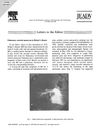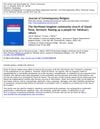 4025 citations,
December 2003 in “Human Reproduction”
4025 citations,
December 2003 in “Human Reproduction” The 2003 consensus updated PCOS diagnosis criteria and linked PCOS to higher risks of diabetes and heart problems, recommending lifestyle changes to lower these risks.
 3 citations,
July 2012 in “British journal of hospital medicine”
3 citations,
July 2012 in “British journal of hospital medicine” The guide helps clinicians diagnose and manage hair loss, detailing examination techniques and treatments for different types of alopecia.
[object Object]  3 citations,
September 1999 in “Journal of the European Academy of Dermatology and Venereology”
3 citations,
September 1999 in “Journal of the European Academy of Dermatology and Venereology” People with Behçet's disease can develop life-threatening lung artery aneurysms that may require surgery.
 2 citations,
April 2017 in “Journal of Investigative Dermatology”
2 citations,
April 2017 in “Journal of Investigative Dermatology” Tofacitinib helped over half of the patients with severe hair loss regrow at least 50% of their hair.

Detailed history and physical examination are crucial for diagnosing hair loss.
 1 citations,
October 2013 in “Expert Review of Dermatology”
1 citations,
October 2013 in “Expert Review of Dermatology” Diagnosing alopecia areata is challenging and requires careful examination and various tests to distinguish it from other hair loss types.
 January 2017 in “Chemistry & Industry”
January 2017 in “Chemistry & Industry” Eating fewer calories may slow aging and removing old cells can increase lifespan in mice.
[object Object]  14 citations,
January 2001 in “Primary Care Update for Ob/gyns”
14 citations,
January 2001 in “Primary Care Update for Ob/gyns” Primary care doctors should address female sexual dysfunctions to improve women's sexual health and life quality.
 5 citations,
May 2023 in “Frontiers in immunology”
5 citations,
May 2023 in “Frontiers in immunology” Environmental factors like diet and vitamin levels, especially Vitamin D, can affect autoimmune diseases differently, with lifestyle changes potentially improving outcomes.
 February 2009 in “Journal of The American Academy of Dermatology”
February 2009 in “Journal of The American Academy of Dermatology” Most patients with Tuberous sclerosis had neurological or skin issues, and over half had psychiatric problems.
 336 citations,
August 2015 in “European Journal of Epidemiology”
336 citations,
August 2015 in “European Journal of Epidemiology” The Rotterdam Study found risk factors for elderly diseases, links between lifestyle and genetics with health conditions, and aimed to explore new areas like DNA methylation and sensory input effects on brain function.
 6 citations,
May 1997 in “Journal of Contemporary Religion”
6 citations,
May 1997 in “Journal of Contemporary Religion” The church aimed to prepare for Yahshua's return by living a New Testament lifestyle and focusing on children's roles.
 July 2003 in “Journal of Cutaneous Medicine and Surgery”
July 2003 in “Journal of Cutaneous Medicine and Surgery” Some medications can improve skin conditions, while lifestyle factors like smoking and drinking may worsen them; treatments like monoclonal antibodies and imiquimod cream show promise for certain skin diseases.
 51 citations,
February 2006 in “Clinics in Dermatology”
51 citations,
February 2006 in “Clinics in Dermatology” Pregnant women often experience skin and hair changes, with over half getting stretch marks and pigment changes, and should be cautious with cosmetic procedures due to potential risks.
 40 citations,
January 2010 in “Annales D Endocrinologie”
40 citations,
January 2010 in “Annales D Endocrinologie” The French Endocrine Society suggests diagnosing PCOS with two of three signs, recommends lifestyle changes and clomiphene for treatment, and calls for more research on certain treatments and tests.
 12 citations,
June 2019 in “Actas dermo-sifiliográficas/Actas dermo-sifiliográficas”
12 citations,
June 2019 in “Actas dermo-sifiliográficas/Actas dermo-sifiliográficas” Proper skin toxicity management in chemotherapy is key to continuing treatment and keeping patient quality of life high.
 12 citations,
August 2013 in “Facial Plastic Surgery Clinics of North America”
12 citations,
August 2013 in “Facial Plastic Surgery Clinics of North America” Hair transplantation is the only permanent solution for female pattern hair loss and can greatly improve quality of life with careful planning.
 2 citations,
January 2004 in “Elsevier eBooks”
2 citations,
January 2004 in “Elsevier eBooks” Lupus affects the skin in various ways, and proper skin examination is crucial for diagnosis and treatment.
 July 2003 in “Journal of Cutaneous Medicine and Surgery”
July 2003 in “Journal of Cutaneous Medicine and Surgery” Stopping certain drugs can improve skin conditions, arsenicosis affects over half of a Bangladeshi village, males are more vulnerable, and certain treatments are effective for warts, acne, and psoriasis. Smoking and drinking are linked to psoriasis in men, a cream helps with a type of skin cancer, and low iron levels don't directly cause chronic hair loss in women.
 January 1989 in “Clinical and Experimental Dermatology”
January 1989 in “Clinical and Experimental Dermatology” The symposium concluded that hair growth involves complex processes, including the hair follicle life cycle, the role of the dermal papilla, hair strength, pigmentation, and the impact of diseases and treatments like minoxidil on hair and skin.
 359 citations,
September 2017 in “European Journal of Epidemiology”
359 citations,
September 2017 in “European Journal of Epidemiology” The Rotterdam Study updated findings on elderly health, focusing on heart disease, genetics, lifestyle effects, and disease understanding.
 42 citations,
May 2013 in “Oral Diseases”
42 citations,
May 2013 in “Oral Diseases” Kennedy's disease leads to muscle weakness without a cure, but exercise and managing symptoms may help patients live a normal lifespan.
 19 citations,
January 2005 in “Paediatrics and Child Health”
19 citations,
January 2005 in “Paediatrics and Child Health” Metabolic syndrome in kids and teens is linked to obesity and increases diabetes and heart disease risk; early lifestyle changes are crucial for management.
 17 citations,
November 2000 in “Journal of the American Pharmaceutical Association”
17 citations,
November 2000 in “Journal of the American Pharmaceutical Association” The document concludes that low-dose oral contraceptives and hormonal therapies can manage perimenopause symptoms and reduce some health risks, but lifestyle changes and disease screening are also important.
 3 citations,
July 1997 in “Current problems in dermatology”
3 citations,
July 1997 in “Current problems in dermatology” Hair restoration surgery has evolved over time, with a focus on natural-looking results and managing patient expectations, while also considering potential complications and the lifelong progression of male pattern baldness.

research Skin
2 citations,
January 2011 in “Elsevier eBooks” Skin problems are common in Lupus patients and can indicate the disease's severity, requiring specific treatments and lifestyle changes.
 1 citations,
November 2023
1 citations,
November 2023 PCOD mainly affects young women, causing symptoms like irregular periods and weight gain, with mixed success from lifestyle changes and medication.
 July 2003 in “Journal of Cutaneous Medicine and Surgery”
July 2003 in “Journal of Cutaneous Medicine and Surgery” Treating psoriasis with UVB light three times a week is faster than twice a week, and certain medications and lifestyle factors affect psoriasis treatment outcomes.
 July 2003 in “Journal of Cutaneous Medicine and Surgery”
July 2003 in “Journal of Cutaneous Medicine and Surgery” Various skin conditions can be treated effectively with different methods, such as discontinuing certain drugs, using specific vaccines, applying creams, and changing lifestyle habits like smoking and drinking.
 July 2003 in “Journal of Cutaneous Medicine and Surgery”
July 2003 in “Journal of Cutaneous Medicine and Surgery” The document concludes that various treatments for skin conditions are effective, but some require further research, and certain factors like gender and lifestyle can influence disease outcomes.





























